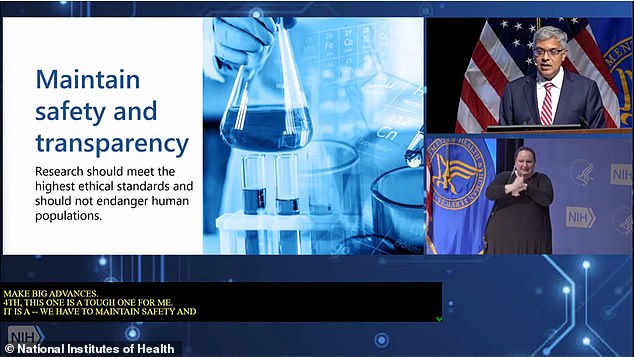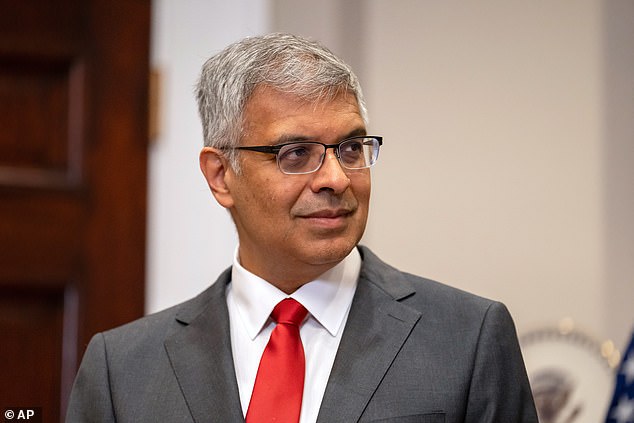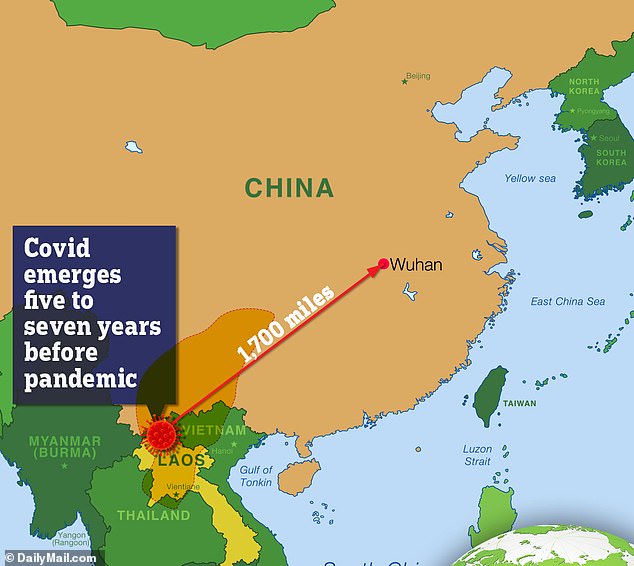Dozens of NIH staff stormed out of a packed auditorium yesterday after a Trump-appointed doctor suggested the US helped start the Covid pandemic.
The researchers, some wearing face masks, walked out as Dr Jay Bhattacharya, the new head of America’s top research institution, delivered his first town hall speech.
Moments earlier, the NIH boss had said: ‘It’s possible that the pandemic was caused by research conducted by human beings, and it’s also possible that the NIH partly sponsored that research.’
He then broke off as at least 30 scientists stormed out, before calling after them: ‘It’s nice to have free speech. You’re welcome, you guys.’
In the years leading up to the pandemic, the US was funding dangerous gain-of-function experiments at the Wuhan Institute of Virology, where the CIA and FBI believe the Covid virus leaked from.
After the scientists left, Dr Bhattacharya continued: ‘If it’s true that we sponsored research that caused the pandemic — and if you look at polls of the American people, that’s what most people believe, and I’ve looked at the scientific evidence and I believe it.
‘[Then] what we have to do is make sure that we don’t engage in research that is any risk…to human populations.’

Dr Bhattacharya triggered the walkout after suggesting that NIH-funded research may have inadvertently led to the Covid pandemic
Dr Bhattacharya was talking at the Masur Auditorium at the NIH Clinical Center in Bethesda, Maryland, around 1pm yesterday when the walkout happened.
The environment was already tense, given that up to $2.7billion in funding had been cut by the new Trump administration — according to the latest estimate.
More than 1,200 members of staff are also thought to have been laid off.
Dr Bhattacharya started the town hall nervously, employees who attended told the federal news website Government Executive.
He also walked out to a stony silence at the start of the town hall, rather than the usual applause afforded to directors.
During the town hall, Dr Bhattacharya also faced heckling over cuts to the NIH’s budget, but argued they were necessary — dismissing some work as ‘ideological’ in nature.
‘There’s been a line of research supported by the NIH that I don’t actually fundamentally believe is scientific,’ he said, ‘and that is ideological in nature’.
‘That doesn’t advance the health and well-being of anybody, but it does diminish public trust.’
He clarified that this included research into ‘structural racism’, prompting backlash from a member of the audience.

The newly appointed NIH head faced a tense town hall with scientists, who at one point also heckled him over cuts to the agency
Dr Bhattacharya also touted Trump’s new executive order during the town hall that ended funding for gain-of-function research in countries of concern.
At the town hall, he had hoped to iron out his five-point plan for the agency, which would emphasize chronic disease, academic freedom, research reproducibility, innovative science and transparency.
Senator Bernie Sanders published a report last week suggesting as much as $2.7billion had been cut from the agency and saying the Trump administration had declared ‘war on science’.
This was far above the previous estimate, which put the tally at $1.8billion cut in grants out of the $36.94billion awarded by the agency in grants every year.
Dr Bhattacharya became well-known during the Covid pandemic for backing the Great Barrington Declaration, which called for an end to lockdowns for all except the most vulnerable.
Then-NIH director Dr Francis Collins called him a ‘fringe epidemiologist’ in emails published in 2021.

Recently, a group of scientists suggested Covid’s precursors may have first emerged in southern China and its neighbor Laos. They suggest it was then moved to Wuhan by animal traders, but are unable to rule out that it could have been moved by scientists
Dr Bhattacharya has previously shied away from backing the lab leak theory, saying on X in May 2022: ‘Who says I believe it was a lab leak? I still don’t.’
But amid an ever-growing body of research supporting the theory, he has now started to signal that it shouldn’t be ruled out as a possibility.
His office did not respond to a DailyMail.com request for comment.
